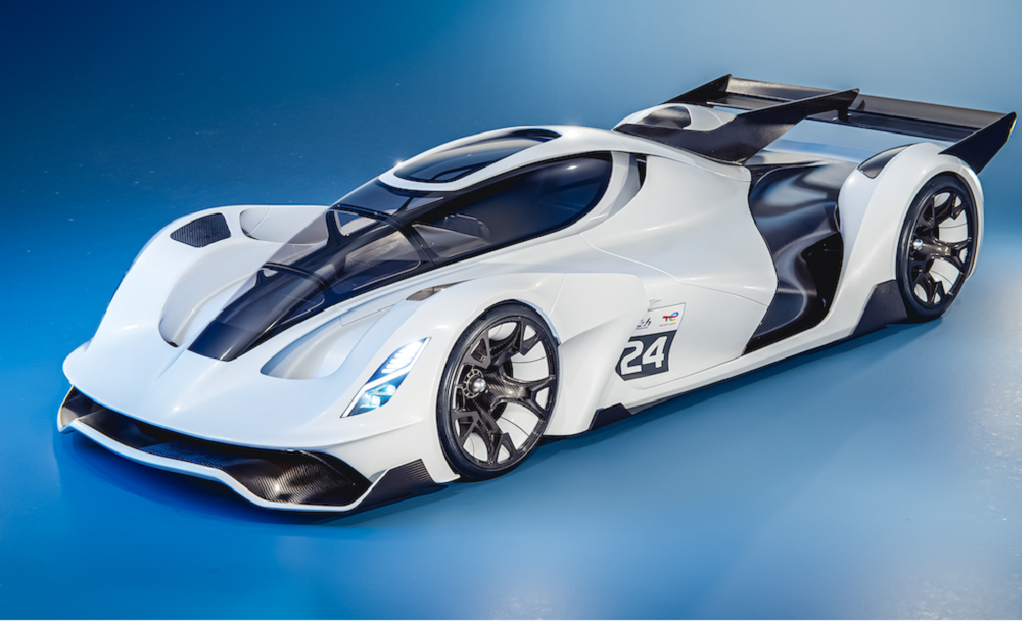The Automobile Club de l’Ouest has unveiled a new electric-hydrogen prototype concept car as part of its Mission H24 project, set to take to the track in January 2025.
The as yet unnamed car is the third to be built as part of the ACO’s ongoing push to incorporate hydrogen technology at the 24 Hours of Le Mans, with plans to introduce an all-hydrogen class beginning in 2026.
Toyota became the first manufacturer to signal significant interest when it unveiled the Toyota GR H2 Racing Concept at the 24 Hours of Le Mans earlier this year, while Peugeot and BMW have also voiced positive comments on the subject.
The ACO has worked on hydrogen development since 2018. Its most recent car, named the H24, took part in several Michelin Le Mans Cup races last year.
Its latest design features an ADESS chassis, which has a central seating position for the driver and a targeted maximum weight of 1300 kg. Norman Nato and Stephane Richelmi remain tied to the project as drivers.
The rear wheels are driven by a single, high-performance electric motor with a maximum power output of 650 kW (872 horsepower), coupled with a gearbox that will run with just a single gear ratio thanks to the large operating range of the electric motor.
The ACO has set the aim for the car to reach top speeds of 320 kph (198 mph) and to be “among the top GT3 entries” at Le Mans.
The car is equipped with a hydrogen fuel cell system using next-gen multi-stack technology developed by project partner Symbio, with a maximum net power output of 300 kW and an estimated power density up to 50 percent greater than the car’s predecessor.
The hydrogen is stored in a pair of tanks that will be able to store 7.8 kg of hydrogen at 700 bars for a total weight of around 100 kg with a target autonomy during racing of 25 to 30 minutes. The tanks are built in compliance with stringent international safety standards for the storage of gaseous hydrogen.
The car will be able to refuel by using infrastructure planned for the future H2 class, which is being designed in close cooperation with project partner TotalEnergies.
A 400 kW lithium battery has been installed to provide dynamic power required by the system and recover available braking energy.
The car sits on Michelin tires, with a target to use only bio-sourced or recycled materials by 2050, with a goal to have 40 percent sustainable materials in 2030.
The ACO’s current timeline states the car design will be finalized by March of next year, with a mock-up due to be revealed in June. Power unit assembly and bench testing is scheduled for October, with the first circuit tests planned for January 2025.
Fans will be able to send in ideas for the car’s name through the ACO’s social media channels, with the chosen name to be revealed on Nov. 13.
Tags: ACO, Car, Hydrogen, TotalEnergy



Recent Posts
New Report Highlights Potential of Voluntary Insetting to Support Maritime Decarbonisation, Calls for Robust Safeguards
Smart Ship Hub achieves industry first with ABS emission reporting
Henkel Rolls Out India’s First Mid-Haul Re-Powered Electric Trucks for Commercial Logistics
Sustainability in Focus at 11th SIAM Automotive Logistics Conclave in New Delhi
L&T Energy GreenTech to Establish India’s Largest Green Hydrogen Plant
JK Srivastava Group and Hynfra Announce $4 Billion Green Ammonia Project in Andhra Pradesh
Andhra Pradesh Unveils Ambitious Green Hydrogen Valley Plan to Lead India’s Energy Transition
South Africa advances plans to decarbonize shipping sector